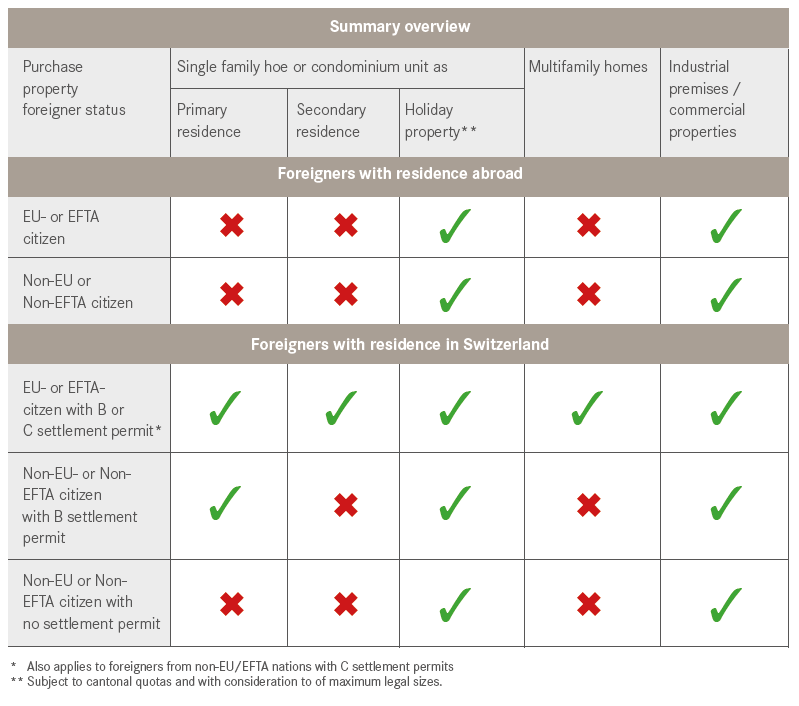One can still feel a protective hand guarding over the Swiss real estate market. The Lex Koller is a unique law of a character unfamiliar anywhere except in a handful of countries. It is not always a given that foreign buyers understand that one cannot simply go to Switzerland and buy real estate. Originally introduced in 1961 as a safeguard against being overrun by foreigners, the restrictions of the law have been relaxed at various points over the past few years. One statistic, tracked since 1967, reveals that by 1993, only 0.8 % of permitted development areas were sold to foreigners. In any case, the significance with second homes and holiday properties is somewhat greater, because in this sector, roughly 1/5 were in foreign hands in 1993.
In many cases, foreigners can buy real estate in Switzerland in spite of Lex Koller. In the following, we provide an overview of the most important exceptions and possibilities for acquiring property ownership in Switzerland despite Lex Koller:
1. Exception: Commercial real estate / industrial premises
The acquisition of commercial properties in Switzerland has been allowed since October 1, 1997. Properties being used for economic or business purposes are considered „commercial.“ Thus, the term „industrial premises“ (Swiss legal term: “Betriebsstätten-Grundstück”) encompasses uses like production buildings, warehouses, offices, shopping centers, retail stores, hotels, restaurants, service stations and also medical offices.
In commercial real estate, it makes no difference whether the property is used by the buyer itself, or leased, or otherwise let to a third party. For foreigners seeking capital investment opportunities, this is the simplest type of investment and option for acquiring land ownership in Switzerland. But the purchase may become complicated if the sale property also features a residential use in addition to its commercial purpose. Residential units on industrial premises can be jointly acquired without permit only under exceptional circumstances. One such exception is if the residential use is considered integral to the business operation. Another exception is business properties that meet the official quota for the residential component (maximum 49 % residential component). Another exception is granted when it is practically impossible and would be disproportionate for the residential spaces to separate them from the commercially used part of the property.
If necessary, one must obtain a declaratory ruling from the cantonal permit authorities.
2. Exception: Vacation / holiday properties
In certain cantons, it is possible to purchase holiday homes. These are not subject to Lex Koller provided the lot size measures less than 1,000 m2 and the net living area is less than 200 m2. „Net living area“ includes all inhabitable spaces, such as bedrooms, kitchen, hallways, bathrooms, toilets, indoor swimming pools, saunas, hobby rooms; it does not include balconies, stairwells, cellars and attics. Based on prevailing practices, if there is evidence of additional space needs, then net residential areas of up to 250 m2 and lot sizes of 1,500 m2 can be approved without any major obstacles; on an exceptional basis, even greater exceedances of the regulated limits may be authorized.
The following cantons have holiday home quotas: Appenzell Ausserrhoden, Bern, Fribourg, Glarus, Graubünden, Jura, Lucerne, Neuchâtel, Nidwalden, Obwalden, St. Gall, Schaffhausen (only for residential units in apartmenthotels), Schwyz, Ticino, Uri, Vaud and Valais.
Furthermore, all cantons must uphold the quotas established by the federal government. Each year, only 1,500 holiday homes in Switzerland can be sold to foreigners without residency in Switzerland. The number varies sharply from canton to canton. The Canton of Valais urrently has the highest quota, at 330 residential units, where as various smaller cantons, like Appenzell Ausserroden, Uri, Nidwalden, Glarus, Obwalden, Jura or Schaffhausen only get 20 units. When a buyer without legal residency seeks to acquire a holiday home, he or she must be accepted into this quota or wait for acceptance. Furthermore, municipalities have created quotas for the percentage ratio of foreigners in multi-family residential properties. Depending on the municipality, this further limits the purchase options for foreigners who possess no legal residency in Switzerland.
3. Exception: Foreigners with residential and tax domicile in Switzerland
In principle, any foreigner with a valid B or C settlement permit can buy a primary owner-occupied residence. „Owner-occupied“ means the residency and tax domicile are placed in the municipality where the purchased property is located. All foreigners can avail themselves of this option to purchase a primary residence. Upon purchase, they have to demonstrate that they are in possession of a settlement permit and that their true domicile will be located in the purchase property. Properties with lot sizes over 3,000 m2 additionally require a special permit. The focus here is specifically on the issue of the „unity of a purchase property“.
Residents from the EU or EFTA territories enjoy further privileges since the bilateral agreements with the EU took effect. After taking up residence in Switzerland (in conjunction with the C settlement permit), they can purchase private and commercial properties without restriction. They may also acquire multifamily residences and second homes for their own use. So in general, these individuals are treated on a par with the Swiss, and are not considered persons abroad as defined in the Federal Law on the Acquisition of Real Estate by Persons Abroad (or „BewG“). Through this change, they can also purchase properties through companies that they control and that are domiciled in Switzerland.
4. Exception: Purchase of shares from Swiss real estate companies and investment funds
The purchase of shares in a stock exchange-listed real estate company is not subject to prior approval and not subject to Lex Koller. The real estate company must be listed on an official exchange based in Switzerland. These are regulated by the Swiss Financial Markets Supervisory Authority (FinMa).
The purchase of shares in an unlisted residential real estate company is a bit more complicated. A company not listed on a Swiss exchange whose true purpose consists of the acquisition or holding of residential properties or other non-industrial properties is considered a residential real estate company. Here, a distinction is made if
- the foreign buyer resides in Switzerland or abroad,
- what kind of settlement permit he or she possesses for Switzerland, and if
- the buyer comes from an EU/EFTA state or a third country.
On the individual cases:
a) Foreigners with domiciles abroad (no matter if EU, EFTA or third nation) may not invest at all in residential real estate companies in Switzerland, not even as minority shareholders. The acquisition of a single share is subject to approval, which will not be granted. Even an investment in the formation of a residential real estate company is not permitted.
b) EU-/EFTA-citizens who reside in Switzerland können sich grundsätzlich uneingeschränkt an allen Immobiliengesellschaften in der Schweiz beteiligen.
c) Foreigners who reside in Switzerland, but who do not originally come from EU/EFTA nations, may only invest in residential real estate companies if they possess a valid permanent settlement permit (C) for Switzerland. Otherwise, no investment in a residential real estate company is possible.
The primary purpose of real estate companies that own commercial and residential sites must be verified by the authorities. Once the share of residential real estate constitutes more than one third of a company, the company may be in violation of Lex Koller, a.k.a. BewG.

Excerpt from the current Wikipedia entry (available online in German only):
Lex Koller ist die informelle Bezeichnung des schweizerischen „Bundesgesetzes vom 16. Dezember 1983 über den Erwerb von Grundstücken durch Personen im Ausland“ (BewG, SR 211.412.41). Der Name des Gesetzes geht auf den ehemaligen Bundesrat Arnold Koller zurück, der bei der Ausarbeitung des Gesetzes Nationalrat war. Zweck der Lex Koller ist die Bekämpfung der „Überfremdung des einheimischen Bodens“. Es beinhaltet eine Beschränkung der Erwerbsmöglichkeiten von Schweizer Liegenschaften durch Ausländer und ersetzte damals die Lex Friedrich, ihrerseits Nachfolgeerlass der Lex Furgler. Bereits in den 1960er / 70er Jahren gab es mit der Lex von Moos und der Lex Celio ähnliche Erlasse.
Aktuell wird darüber diskutiert, die Lex Koller abzuschaffen und es Ausländern zu ermöglichen, ohne kompliziertes Bewilligungsverfahren Grundstücke in der Schweiz zu erwerben. Der Grund für diese Diskussionen sind einerseits die Bilateralen Abkommen mit der Europäischen Union und andererseits der Druck von an einer liberalisierten Regelung aus z.B. steuerlichen Gründen besonders interessierten Kantonen. Eine Liberalisierung würde den Zweitwohnungsbau mit sog. kalten Betten stark begünstigen.
References / statement of waiver:
The information provided here was compiled from current laws and publications. The author expressly states that individual passages were drawn from the source text, and did not originate from his writings. In order to improve readability, this text dispenses with footnotes and reference notes within the body of the text.
Bulletin of the Federal Office of Justice
Acquisition of real estate by persons abroad (available in four languages)
Ordnance on the acquisition of real estate by persons abroad
(BewV) of October 1, 1984 (Version dated January 1, 2008)
Bundesgesetz über den Erwerb von Grundstücken durch Personen im Ausland
(BewG) of December 16, 1983 (Version dated January 1, 2011)
Opinion of Ginesta Real Estate on current efforts by the Federal Council to abolish Lex Koller
Parliament has been debating the abolition of Lex Koller for some time now. Conversely, development planning restrictions are being considered, foremost in the secondary homes sector, which would affect both domestic and foreign buyers. The National Council rejected proposals by the Federal Council, with the request that they consider the following points when drafting the revised bill:
1. The introduction of a minimum residency period in Switzerland as prerequisite to property acquisition
2. Measures to resolve problems affecting secondary residences („cold beds“, i.e. private holiday homes that remain unused for most of the year.)
3. The „compatibility“ of both bills with the tandem initiative „Save Swiss Land“
The proponents of Lex Koller are seeking to stem the flow of foreigners into Switzerland, and prevent the purchase of luxury properties by foreigners who hold no residency status in Switzerland; opponents advocate making Switzerland even more open. We Swiss are able to acquire residential properties almost anywhere in the world: Why should we fail to grant this same privilege to foreigners?
Ginesta Immobilien represents no political stance, and is acting according to the political realities. At the same time we are of the opinion that the debate on the abolition thusfar at the federal level has not been comprehensible enough for the voting public. The Federal Council sought to abolish Lex Koller at the federal level, while at the same time empowering municipalities and the cantons with instruments, in the form of urban planning measures that essentially replace the federal law. These aims and their implications are unclear to date. They must be weighed out precisely - provided their implications are known to the voting public. Therefore, we can appreciate the hesitant stance of Parliament, and welcome further examination of the proposed changes to the legislation.
Author: Claude Ginesta

Claude A. Ginesta is a federally licensed real estate fiduciary (registered with the SVIT, the Swiss Federation of Real Estate Fiduciaries) and owner and CEO of Ginesta Real Estate AG.
The company was founded in 1944 and specializes in the sale of properties in the Zurich and Grisons markets. With offices in Küsnacht, Horgen and Chur, the company operates as real estate broker throughout Switzerland for properties located across the country.
Publisher of the “Illusions” series Ginesta Real Estate AG, www.ginesta.ch









